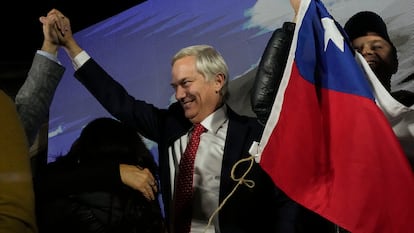José Antonio Kast, the far-right Catholic who is winning over Chile
The 57-year-old lawyer with nine children leads the Republican Party, which on Sunday became Chile’s leading political force. Critical of same-sex marriage and abortion, in 2007 he tried to ban the emergency contraceptive pill


The Republican Party has turned Chilean politics on its head. The far-right force, led by 57-year-old lawyer José Antonio Kast, won a record number of votes last Sunday in the elections for the Constituent Council, which will draft a new proposed Constitution.
The party - which defends the current charter, written in 1980, during the dictatorship of Augusto Pinochet - obtained 35% of the votes, equivalent to 23 seats (out of 51) in the body in charge of writing a new Constitution. Bleeding out the three parties of the traditional right (the UDI, Renovación Nacional and Evópoli, which together achieved 21% of the vote), on May 7 the Republican Party became the Chilean party that achieved the highest percentage of votes since 1965, when the Christian democrats were the hegemonic force under Eduardo Frei Montalva. It did so with 3.5 million votes nationwide, in an election with an 85% turnout, 50 years after the 1973 coup d’état. The party achieved this undisputed success with Kast at the helm.
Benevolent with Pinochet, the Republicans fill their proposals with emotions, talking about topics such as order, peace, crime, progress, homeland, immigration control? “The ideas of common sense”, as Kast defined them after the success at the polls of the party, which has won a majority in 254 of the country’s 345 municipalities. “Today there is nothing to celebrate: because Chile is not well, because Chileans are not well and that must be engraved in the heart,” said Kast on Sunday, after the vote, at a rally at the headquarters of his party, with the Chilean flag in the background and dressed in suit and tie.
He appealed to families “burdened and fatigued by uncertainty; economic pressure and uneasiness; job loss, which has been increasing; by fear”. With citizen insecurity as the main concern of Chileans, Kast spoke of people who “suffer day and night and who see how the peace of their neighborhoods has been vanishing”. “It is time to work with unity for the good of Chile”, continued the politician who, in contrast to his radical discourse, speaks with a particularly calm tone.
Harshness towards Boric
Unlike the traditional right, Kast was especially hard on the government of Gabriel Boric, who arrived at La Moneda, Chile’s presidential palace, in March 2022, with the support of a new generation of leftists, the Frente Amplio. “Chile has defeated a failed government and that must be said loud and clear. A government that has been unable to face the security, migratory, social, education, health, housing and many other crises. A government where many things are collapsing”, Kast assured amidst cheers. “We will begin to rebuild and recover our beloved country”, he added to finish off his criticism of the current Administration, whose popularity does not exceed 30%.
Of German descent, the lawyer of the Catholic University of Chile has nine children, is a practicing Catholic and is an adherent of the Schoenstatt apostolic movement. The Republican Party, which he founded in 2019, opposes equal marriage, adoption of minors by same-sex couples, abortion, sex education in schools and an abstract set of ideas they call “gender ideology.”
In 2007, as a deputy of the UDI, one of the traditional right-wing parties, he led an unsuccessful request before the Constitutional Court to prevent the commercialization of the emergency contraceptive pill. These positions have facilitated the convergence of Protestants to his formation. Thus, evangelicals are one of the electoral support bases of the Republicans, as evidenced in the last elections: “In the group of municipalities with the highest evangelical concentration, the Republican Party obtained an average support of 42.8%; in those with the lowest, it reached 30.1%”, a post-electoral study by the Universidad del Desarrollo summarizes.
Although he leads a recently created force, Kast has a long trajectory in politics. Between 1995 and 2000, when the center-left governments of the Concertación coalition were beginning a long internal crisis that ended with its demise, he served as a councilman in the municipality of Buin, with a strong farming tradition, in the southern zone of Santiago de Chile, where he was born and resides.
Between 2002 and 2018 he was a deputy for the UDI, the right-wing party that in the early 2000s was the main Chilean political force and was on the verge, in 1999, of reaching La Moneda led by Joaquín Lavín. As a parliamentarian, Kast prioritized religious and moral issues and was not in the front line when it came to defending Pinochet’s legacy. And although he became the general secretary of the party, in 2016 he resigned after failing to achieve a shift towards these moralist positions.
The first time the lawyer ran for president was in 2017, when he challenged the conservative Sebastián Piñera. He ran as an independent, obtaining 7.93% of the vote. In that campaign, he said, “If he were alive, [Pinochet] would vote for me.” After the elections, Piñera revalidated his mandate in La Moneda. His second presidential attempt, with the Republican Party this time, was in 2021: leading after the first round, he lost in the second round to Boric. Since then, the far-right formation has grown in the wake of the Government’s fiasco over the constitutional plebiscite - rejected by 62% of the population in September last year - and also because of its hard-handed, law-and-order rhetoric.
Unlike other leaders of the extreme right at regional level -such as the Brazilian Jair Bolsonaro, with whom Kast met in 2018 to give him a Chilean national soccer team jersey-, the Chilean lawyer has not encouraged anti-democratic actions, although among his ranks there are parliamentarians (they have 12 deputies and two senators) who exhibit without problems their radicalism.
After his triumph in the last elections, and despite the fact that his party’s position was against starting the constituent process, everything points to the fact that the party will comply with the mandate to change the constitution, which will end in December with another vote. To a large extent, the success -or failure- of the process will be linked to the Republican Party and José Antonio Kast.
Sign up for our weekly newsletter to get more English-language news coverage from EL PAÍS USA Edition
Tu suscripción se está usando en otro dispositivo
¿Quieres añadir otro usuario a tu suscripción?
Si continúas leyendo en este dispositivo, no se podrá leer en el otro.
FlechaTu suscripción se está usando en otro dispositivo y solo puedes acceder a EL PAÍS desde un dispositivo a la vez.
Si quieres compartir tu cuenta, cambia tu suscripción a la modalidad Premium, así podrás añadir otro usuario. Cada uno accederá con su propia cuenta de email, lo que os permitirá personalizar vuestra experiencia en EL PAÍS.
¿Tienes una suscripción de empresa? Accede aquí para contratar más cuentas.
En el caso de no saber quién está usando tu cuenta, te recomendamos cambiar tu contraseña aquí.
Si decides continuar compartiendo tu cuenta, este mensaje se mostrará en tu dispositivo y en el de la otra persona que está usando tu cuenta de forma indefinida, afectando a tu experiencia de lectura. Puedes consultar aquí los términos y condiciones de la suscripción digital.








































